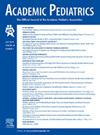美国儿科住院医师指导项目的概况。
IF 2.8
3区 医学
Q1 PEDIATRICS
引用次数: 0
摘要
背景:指导是研究生医学教育中临床和专业发展的一种日益增长的方法。人们对全国住院医师培训计划的目标和实施变化知之甚少。目的:我们描述了目前全国儿科住院医师指导项目的现状,包括项目目标、障碍和指导项目实施的促进因素。方法:在2022年9 - 10月,我们对儿科住院医师项目主任进行了一项全国性的、基于网络的横断面调查。数据分析采用描述性统计、推理统计和内容分析。结果:46%(84/183)的儿科住院医师项目主任做出了回应。40%(34/84)的受访者表示目前有一个教练项目,27%(23/84)的受访者正在考虑开发项目。大多数项目对住院医生进行多个培训级别的培训,最常见的是对第一年住院医生进行培训。在大多数项目中,主治医生担任教练(79%,27/34),而41%(14/34)利用住院医生、研究员或非医生担任教练。教练项目的主要目标包括专业技能发展(74%,25/34)、沟通(68%,23/34)、临床护理(65%,22/34)、幸福感(59%,20/34)和补救(50%,17/34)。项目认为教练有多种好处,包括提高住院医生的表现,促进成长心态,支持挣扎的住院医生,社区建设,增加住院医生和教师的参与度。教练项目实施的障碍包括时间、资金、教师支持、专业发展需求和职业倦怠。结论:指导是一种促进培训生发展的新兴方法,至少30%的儿科住院医师项目目前正在采用或考虑未来发展指导项目。住院医师项目在技能发展、社区意识和参与方面对住院医师和教师都有好处。本文章由计算机程序翻译,如有差异,请以英文原文为准。
The Landscape of Pediatric Residency Coaching Programs in the United States
Objective
Coaching is a growing approach within graduate medical educatin for clinical and professional development. Little is known about the variation in the goals and implementation of residency coaching programs nationally. We describe the current national landscape of coaching programs across pediatric residencies, including program goals, barriers, and facilitators to coaching program implementation.
Methods
In September to October 2022, we conducted a deidentified national cross-sectional, web-based survey of pediatric residency program directors. Data were analyzed using descriptive and inferential statistics and content analysis.
Results
In total, 46% (84/183) pediatric residency program directors responded; 40% (34/84) reported currently having a coaching program; and 27% (23/84) were considering program development. Most programs coached residents at multiple training levels, with first-year residents most commonly coached. Attending physicians served as coaches in most programs (79%, 27/34), while 41% (14/34) utilize residents, fellows, or nonphysicians as coaches. The top goals of coaching programs included skill development in professionalism (74%, 25/34), communication (68%, 23/34), clinical care (65%, 22/34), well-being (59%, 20/34), and remediation (50%, 17/34). Programs perceived multiple benefits of coaching, including enhancement of resident performance, growth mindset promotion, support for struggling residents, community-building, and increased resident and faculty engagement. Barriers to coaching program implementation included time, funding, faculty buy-in, professional development needs, and burnout.
Conclusions
Coaching is an emerging approach to promoting trainee development, with at least 30% of pediatrics residency programs either currently employing or considering future coaching program development. Residency programs perceived benefits for both residents and faculty in skill development, sense of community, and engagement.
求助全文
通过发布文献求助,成功后即可免费获取论文全文。
去求助
来源期刊

Academic Pediatrics
PEDIATRICS-
CiteScore
4.60
自引率
12.90%
发文量
300
审稿时长
60 days
期刊介绍:
Academic Pediatrics, the official journal of the Academic Pediatric Association, is a peer-reviewed publication whose purpose is to strengthen the research and educational base of academic general pediatrics. The journal provides leadership in pediatric education, research, patient care and advocacy. Content areas include pediatric education, emergency medicine, injury, abuse, behavioral pediatrics, holistic medicine, child health services and health policy,and the environment. The journal provides an active forum for the presentation of pediatric educational research in diverse settings, involving medical students, residents, fellows, and practicing professionals. The journal also emphasizes important research relating to the quality of child health care, health care policy, and the organization of child health services. It also includes systematic reviews of primary care interventions and important methodologic papers to aid research in child health and education.
 求助内容:
求助内容: 应助结果提醒方式:
应助结果提醒方式:


